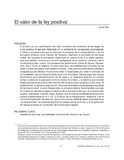El valor de la ley positiva
Compartir este ítem
Fecha
2004-06-30Autor
Tale, Camilo
Citación
Metadatos
Mostrar el registro completo del ítemDocumentos PDF
Resumen
The article is a reassertion of the intrinsical worth of the most of rules of positive law, issued in an environment of generalized transgression and in opposition to the views which on account of emphasize the value of judge sentences or principles as sources of law, depress the civil laws authority. The classical conception of the rule of law, which not only conceives it as a way for refrain the men, but also affirms its pedagogical function in order to the right behavior and conducive to common good actions is remembered. Respective Aquinas, Holmes, Hart, Raz and Finnis theories about the point are compared. The author deals with the reasonableness in the rules of law contents: There are unreasonable and unjust precepts, and there is a wise and fixed courts of justice doctrine that declares them “inconstitutional” and inapplicable, because of the violation of the “reasonableness principle”; however most of the rules of law are reasonable. Then the author points out two doctrinal causes of the theorical unworthness of the rules of law and its nowadays practical contempt: the idea of the separation between morals and law, and the doctrine that assumes the individual freedom as the greatest human good (as W Goldschmidt taught, among others). Finally, the author dissaproves, under the title “Theories that favourish the judicial disobedience of civil laws”: a) an erroneus thought which in the name of natural law an equity exaggerates the scope of the admissible judge discretion; b) the “judicialist” juridical positivism (Holmes, Ross, Kelsen), which has been the prevailing mode of positivism in the 20th century; c) the abuses of “systemical” interpretation and “constitutionalization” of law, which seek to legitimate the disregarding of the law rules, through pseudo-constitutional interpretations of it; d) the application of false principles instead of the legal precepts. El artículo es una reafirmación del valor intrínseco del contenido de las reglas de la ley positiva en general, elaborado en un ambiente de transgresión generalizada, y frente a concepciones que al acentuar la primacía de la jurisprudencia o de los principios jurídicos como fuentes del Derecho, deprimen la autoridad de las leyes civiles. Se recuerda la concepción clásica que no reduce la ley a su papel represor, sino que también reconoce su función pedagógica de la conducta correcta y de lo conducente al bien común. Se comparan las doctrinas de Tomás de Aquino, Holmes, Hart, Raz y Finnis al respecto. El autor trata de la razonabilidad del contenido de las leyes: Existen preceptos irrazonables e injustos, y hay doctrina tribunalicia acertada y arraigada que las declara “inconstitucionales” e inaplicables por violar el “principio de razonabilidad”; pero la mayoría de las leyes son razonables. Señala luego dos causas doctrinarias de la desvalorización de las leyes y su desprecio práctico en nuestro tiempo: la idea de la separación entre lo moral y lo jurídico, y la doctrina que concibe la libertad individual como el bien máximo del hombre (como enseñara, entre otros, W Goldschmidt). Finalmente, bajo el título “Doctrinas favorables a la desobediencia judicial de las leyes civiles”, el autor desaprueba: a) el iusnaturalismo mal entendido que bajo el nombre de equidad exagera el alcance de la discreción del juez; b) el positivismo jurídico “judicialista” (Holmes, Ross, Kelsen), que ha sido la modalidad de positivismo jurídico predominante en el s. XX; c) el abuso de la interpretación “sistémica” y de la “constitucionalización” del derecho, que ocurre cuando mediante falsas interpretaciones “constitucionales” se pretende legitimar la inobservancia de la ley; y d) la aplicación de falsos principios en sustitución de los preceptos legales.
URI
http://revistas.udem.edu.co/index.php/opinion/article/view/1326http://hdl.handle.net/11407/1705


